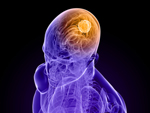 Brain tumors are, sadly, incurable. In times of strife, people seek out the sorts of treatments that will improve their quality of life and hopefully stall the disease. A new study has found that many patients are turning to alternative therapies — such as taking vitamins and visiting a homeopath – to complement their conventional treatments.
Brain tumors are, sadly, incurable. In times of strife, people seek out the sorts of treatments that will improve their quality of life and hopefully stall the disease. A new study has found that many patients are turning to alternative therapies — such as taking vitamins and visiting a homeopath – to complement their conventional treatments.
That study was published last week in “Neurology.” Researchers found that about 40% of brain tumor patients in the study took to alternative medicine. The leaders were homeopathic remedies, vitamin supplements and psychological therapy.
The researchers believe the use of such treatments may be largely overlooked and underestimated by doctors. They encourage physicians and oncologists to be aware of patients’ desire to seek alternative treatments. Everyone deserves to know all the options on the table. And guidance from a doctor will help a lot when patients start to try and help themselves.
In the study, 621 people with incurable “gliomas” completed questionnaires about their use of alternative therapies. Alternative therapy was defined as methods or compounds not used in routine clinical practice and not scientifically evaluated. Younger people, women, and those with more education were more likely to use alternative treatments than older people, men and those with less education.
Most are turning to alternative medicine, not because they dislike conventional care, but because they want to add something beneficial to their care. They want to be a part of it. They want to feel that they are helping to defeat the disease that is hurting them. Alternative medicine, as it stands, can do more than simply make someone feel they are partaking in their own treatment. Many studies have found that, at the very least, alternative medicine can significantly improve one’s quality of life and reduce symptoms.
Why were the patients seeking alternative treatment? The most commonly chosen responses were “to support conventional therapy,” “to build up body resistance” and “to do something for the treatment by myself.” The least commonly chosen responses were “because I am afraid of the conventional methods” and “because the physicians don’t have enough time.”
Of those who used alternative treatments, 39% used homeopathy, 31% used vitamin supplements and 29% used various psychological methods. Homeopathy is a system of medicine that arose in the 1800s, based on taking a tiny amount of a toxic substance, diluting it, and using it to treat the very same symptoms it would normally cause in a high amount.
In dire situations, a cancer diagnosis, feel empowered by seeking alternative medicine.
